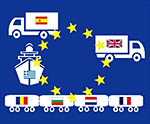The European Commission published its initial findings from a study of e-commerce. They were somewhat disappointed to find that what they term “geo-blocking” is widespread. By which they mean that many companies decide not to sell abroad, as well as specific contractual barriers set up by companies to stop consumers from shopping online across EU borders.
Replies were received from more than 1400 retailers and digital content providers from all 28 EU Member States. Over a third of the retailers admitted to “geo-blocking” – in most cases this just meant that they refused to deliver abroad. Some would not accept foreign payment methods, and a few would re-route or block foreign website access. In 12% of cases their behaviour was governed by contractual restrictions.
Later this year we expect to see another report on this and other aspects of e-commerce followed by a consultation period and, at some point, a draft Regulation.
Early indications are that there is no intention to require businesses to deliver in all EU territories, nor will they have to charge the same prices in different Member States. But it is likely to become illegal to divert foreign visitors automatically to a website in their home country and to charge different amounts purely on the basis of an IP address. It may also become difficult to justify refusing a foreign credit card payment.
However, at this point a definitive list of “dos” and “don’ts” is seen as unlikely and the basic principle of businesses choosing where to operate remains.

